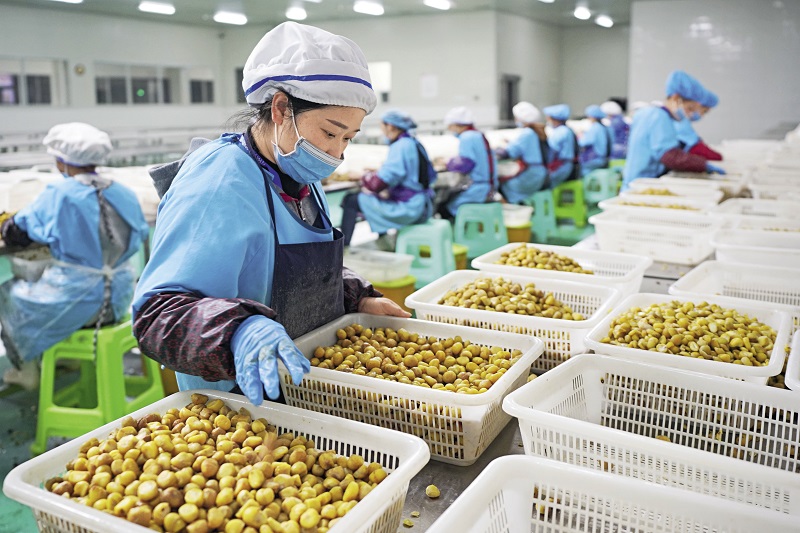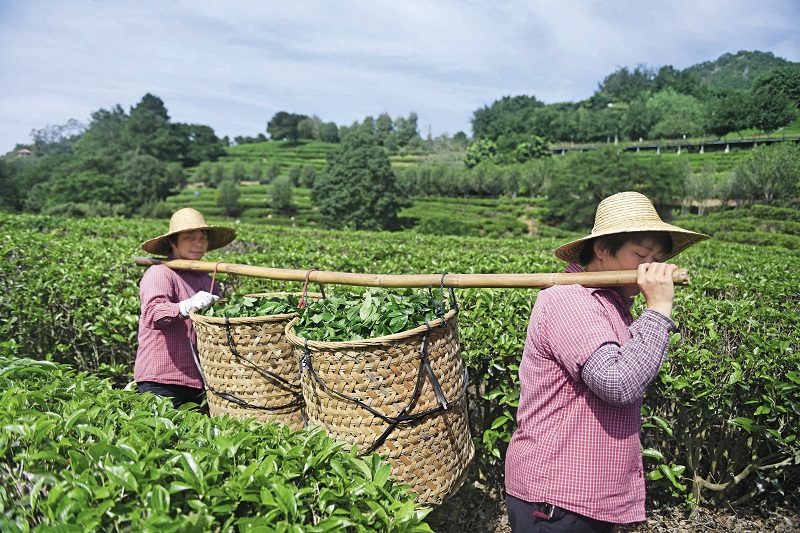A growing number of enterprises have responded to the call of common prosperity, a topic which has become the center of much discussion recently. “How to contribute to common prosperity is becoming a contemporary manifestation of corporate social responsibility (CSR),” said Qu Yongyi, Party secretary and deputy director of the Institute of Industrial Economics of the Chinese Academy of Social Sciences, adding that there is consensus among many on its role and direction.

Thanks to the 10,000 Enterprises Revitalizing 10,000 Villages program, locals in Wangmo County, Guizhou Province can now work at a Chinese chestnut processing plant after the chestnuts are harvested, with a monthly income of RMB 3,000.
From Passive to Proactive
Speaking of CSR in the process of promoting common prosperity, Li Anping, chairman of Zhendong Group, who had to drop out of school to do farmwork to reduce his family burden as a teenager, was deeply moved. When the All-China Federation of Industry and Commerce launched the 10,000 Enterprises Revitalizing 10,000 Villages program, Zhendong Group offered to help Pingshun County in Changzhi, Shanxi Province. Located deep in the Taihang Mountains, Pingshun is the county with the highest incidence, the widest range, and the deepest degree of poverty in Changzhi, with 51,997 people living below the poverty line.
Through field study and evaluation, the poverty alleviation team led by Li found that Pingshun has a long history of planting traditional Chinese medicinal materials. There are more than 300 kinds of medicinal plants growing in and around the county. To tap into these favorable conditions, Zhendong Group developed the Chinese herbal medicine growing industry in the county by establishing a 33,000 hectares medicinal raw material plantation and processing base.
The group successively explored the formation of a grid management model to help each poor household in the county. Through the operational model of “government + company + professional cooperative + farmer,” the base ensures that there are buyers for farmers’ plants, hence eliminating farmers’ concerns about devoting time and resources into growing Chinese medicinal materials with no results. The group signed land lease and purchase and labor contracts with impoverished households. Seasonal employment gives poor households additional incomes. Li rejoiced that Pingshun County achieved poverty alleviation one year ahead of schedule in 2019.
Since the online travel service provider Ctrip Group launched Magnificent Land, a tourism poverty alleviation program, local resources have been revitalized and its stores have reached more than 450 county-level cities, including stores in 16 impoverished counties. Poverty alleviation has enabled hundreds of young people in small towns to work at home. Some of them can earn a monthly salary of over RMB 10,000, which is about four times higher than the local per capita income. Ctrip’s holiday farms also give priority to hiring local residents and drive local economic development. Rezen Group, a high-end hotel operating brand under Ctrip, undertakes the follow-up operation and management of these holiday farms. According to its CEO Lu Yun, in addition to empowering the farms and surrounding homestays in terms of high-end hotel system supporting, technology, and marketing management, Rezen also pays special attention to local talent recruitment and training. For example, the farms give priority to hiring local residents, especially members of poor families.

The Yannanfei Tea Field scenic area in Meizhou, Guangdong Province, serves as a successful model of local enterprises assisting rural development.
Promoting Rural Development
The private economy, as an indispensable force for promoting China’s economic and social development, has become an important source of entrepreneurship, employment, technological innovation, and state revenue. In the process of pursuing common prosperity, its power must not be underestimated.
Two years ago, Meng Wenhai, leader of the ninth batch of cadres dispatched from Shanghai to Tibet worked as the deputy Party secretary of Xigaze. He led a team to visit Ctrip Group, hoping that Ctrip could use its resources and talent advantage in the tourism industry to help Xigaze’s tourism development. They quickly reached a consensus, and Ctrip became the first private enterprise in Shanghai to participate in the provision of aid to Tibet. Utilizing its resources and strengths, it went all out to help Xigaze win the battle against poverty. The company selected Deng Qi, a gen-z (post-90s) employee to be in charge of Tibet’s tourism business, from more than 30,000 employees. With joint efforts, a new tourist route with the Himalayas at its core is taking shape. According to the plan, Ctrip will annually arrange 50,000 tourists for the route after two years. Calculated at a price tag of RMB 5,000 per visitor, it will directly bring in sales of RMB 250 million to the region.
CD Finance is a comprehensive rural service institution focusing on serving disadvantaged groups in rural areas to develop economy, increase income, and achieve prosperity. Drawing on international experience, it carries out localized practices by designing products that combine digital models with manual credit surveys to meet the financial needs of rural towns with precision. Its operation gives full play to the advantages of microfinance in poverty alleviation.
According to its chairman and general manager Liu Dongwen, as of the first half of 2021, CD Finance had established branches in 400 counties across the country, providing a total of more than 4.7 million loans worth more than RMB 80 billion, of which loans directly used for planting and aquaculture production accounted for 44 percent. At present, of the over 430,000 borrowers, more than 70 percent are female, benefiting more than seven million farmers. “As a powerful tool for poverty alleviation, microfinance not only serves as an effective supplement to the services of traditional financial institutions, but also stimulates the endogenous motivation of the poor by means of ‘teaching a man to fish,’ so that they can develop production in their hometowns, which promotes local employment,” Liu said.
In recent years, with the advancement of the rural revitalization strategy, the needs of rural people have also undergone tremendous changes, and new requirements have also been placed on agricultural service organizations. In this context, CD Finance has continued to upgrade its business, innovate its services, and use digital technology to integrate finance and production factors to better promote industrial revitalization and increase farmers’ incomes.
According to Liu, CD Finance will continue to improve its services and build a comprehensive service platform with the help of digital technology to achieve specialization and scale. It will enhance functions such as information connectivity, resource integration, transaction, financial support, technical training, and entrepreneurial counseling, hence better assisting the development of modern agriculture and increasing rural entrepreneurial vitality. It will also continue to promote its capacity and organization building to provide a better employment and development environment for rural talent.
At present, CD Finance has more than 6,000 employees, of which more than 80 percent work at the grassroots level. They come from tens of thousands of villages in more than 400 counties across the country, and most of them are local farmers or small and micro entrepreneurs. Their education background is mainly under junior college and the average age is about 36 years old.
Regarding how to better contribute to common prosperity in the coming years, Li Anping said, “Society is developing, consumption is upgrading, and everyone’s income is growing. Now all farmers are out of poverty. But some of them might fall back into poverty due to illness, accidents, or natural disasters. Therefore, Zhendong Group has overhauled its pattern of poverty alleviation and focuses on long-term development of the Chinese medicinal material planting industry.”
So far, the group has helped farmers form 486 professional cooperatives, and built standardized planting bases in 19 impoverished counties including Pingshun and Qinxian, which has led to a steady increase in the income of 220,000 poor households, with an average household income increase of RMB 2,000 to 3,000. In a recognition of its valiant efforts, Zhendong Group has won the “National Poverty Alleviation Contribution Award” and the “National Poverty Alleviation Model” title, the only company to win both honors.
YUAN SHUAI is a reporter with Insight China.